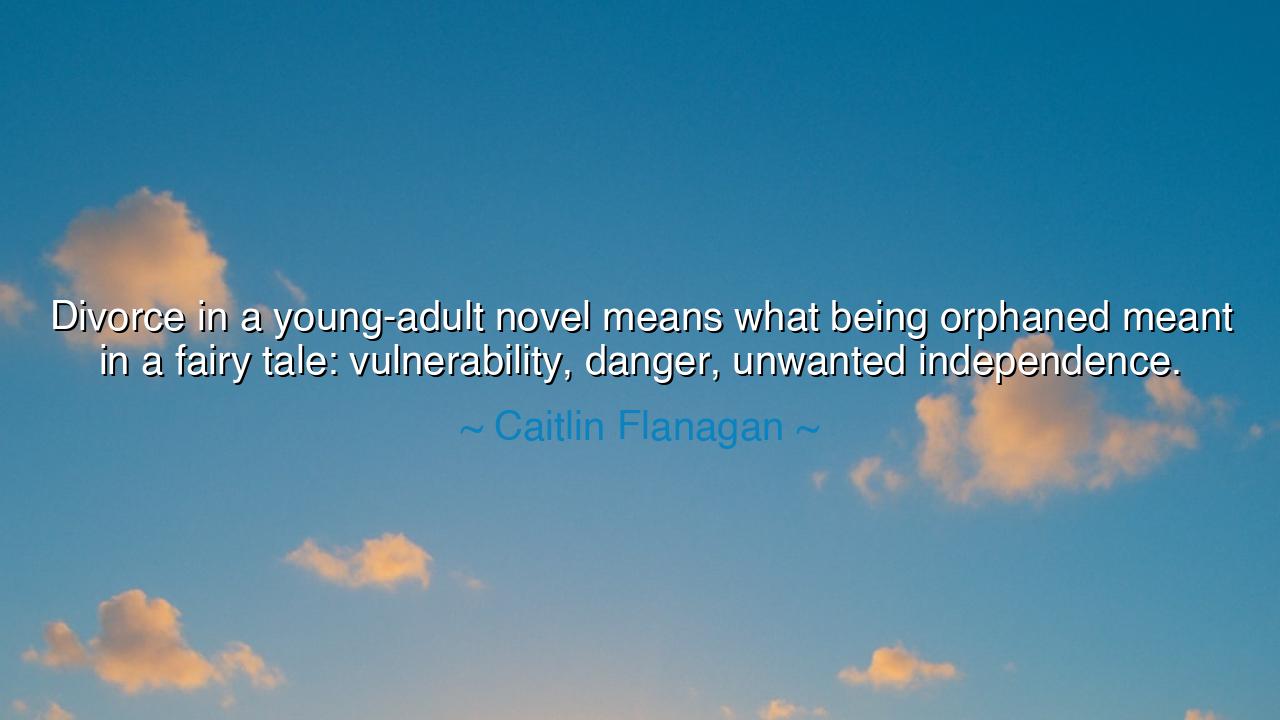
Divorce in a young-adult novel means what being orphaned meant in
Divorce in a young-adult novel means what being orphaned meant in a fairy tale: vulnerability, danger, unwanted independence.






In the words of Caitlin Flanagan, “Divorce in a young-adult novel means what being orphaned meant in a fairy tale: vulnerability, danger, unwanted independence.” Hear then, children of the present age, and reflect upon these words, for they are heavy with the sorrow of modern times. Once, in the tales of old, to be orphaned was to be cast into the wilderness of the world—without the protection of hearth or kin, left to face the beasts of fortune and the tempests of fate. Yet now, in our age of broken households and quiet estrangements, the wound of the orphan’s sorrow takes a subtler form. The divorced child, though not without parents, bears the mark of divided love—a heart split between two homes, two loyalties, and often, two silences.
In the realm of the ancients, the orphan stood as the emblem of vulnerability, for without the shield of family, one faced the world’s cold breath alone. And so too, in the young-adult tale, the child of divorce walks that same lonely road—not always forsaken, but uncertain of where the hearth’s warmth truly lies. The world, in its ceaseless hurry, gives them unwanted independence, bidding them to grow before their time, to build armor from tenderness, and wisdom from pain. For when the pillars of the home crumble, the young must fashion their own walls from courage.
Consider, for a moment, the story of Mary Shelley, born to parents of fierce intellect—William Godwin and Mary Wollstonecraft. Her mother perished soon after her birth, and her father’s household grew complex and cold. In her youth, she wandered between affection and neglect, belonging everywhere and nowhere. From such soil was born Frankenstein, a tale not merely of monsters and creators, but of abandonment, of creation left untended, of a soul cast into the void to learn love from its absence. Shelley’s orphanhood was her fire; from it, she forged immortal art. And so too, today’s children of divorce turn their wounds into wisdom, their solitude into stories.
Know this truth, then: vulnerability is the beginning of strength. The child who learns to stand amid the ruins of a home learns to build cathedrals within their soul. For danger is not the destroyer—it is the teacher. Just as the orphan of old tales faced dragons to find their destiny, so must the modern youth face the dragons of doubt, loneliness, and fear. The world whispers to them: “You are on your own,” and in answering, they discover the sacred voice within that says, “Then I will become my own light.”
Yet let us not be unfeeling. Divorce, like the splitting of the earth, leaves a scar upon the generations. Parents, heed this: to divide your home is not merely to part ways, but to rend the fabric of your child’s world. Still, love can yet bridge the chasm if both sides build not walls, but paths of grace. Speak gently, forgive often, and remember—the heart of a child measures time not in years, but in tenderness given and withheld.
To the young who find themselves in this storm, take heart. You are not cursed—you are forged. The fairy tales taught that the orphan, through courage and kindness, would one day become the hero. So too, you shall rise. Walk not with bitterness, but with compassion; for the wound that once made you tremble can one day heal others. The independence you did not seek will teach you to choose your own truth.
The lesson, dear listener, is this: life will sometimes take from you the shelter you believed eternal. But what it takes, it may also transform. If you find yourself cast into unwanted independence, do not despair. Build your own home within—one of patience, wisdom, and love freely given. Tend to others who walk the same lonely path. For in doing so, you will fulfill the deepest purpose of the ancient tales: to turn loss into light, and solitude into strength.






AAdministratorAdministrator
Welcome, honored guests. Please leave a comment, we will respond soon